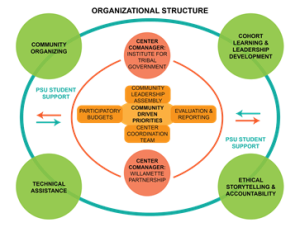Willamette Partnership, Portland State, and Rural Community Assistance Corporation will join partners to build capacity in Alaska, Idaho, Oregon, and Washington
 Portland, OR – Willamette Partnership, Portland State University’s Institute for Tribal Government, and the Rural Community Assistance Corporation are proud to announce that they have been awarded a historic opportunity through the Environmental Protection Agency (EPA) to establish one of two northwest Environmental and Energy Justice Thriving Communities Technical Assistance Centers for Region 10.
Portland, OR – Willamette Partnership, Portland State University’s Institute for Tribal Government, and the Rural Community Assistance Corporation are proud to announce that they have been awarded a historic opportunity through the Environmental Protection Agency (EPA) to establish one of two northwest Environmental and Energy Justice Thriving Communities Technical Assistance Centers for Region 10.
These lead partners, alongside nine additional academic, business, government and nonprofit organizations will create a regional technical assistance center to serve communities in Alaska, Idaho, Oregon, and Washington. The funding will be used to directly support communities where environmental, health, and economic burdens and capacity constraints co-occur, including Tribal and Indigenous communities, Black, Latinx, immigrant, and disabilities communities, especially in remote and rural areas. Over the course of five years, this historic $10 million funding will provide technical support, training, and resources to help communities address environmental and energy challenges and build resilience.
“This particular funding addresses some fundamental concerns around taking care of community — which is really about resources,” said Direlle Calica, Director of the PSU Institute for Tribal Government based in Portland, Oregon. “In Tribal communities, we take care of resources and they take care of us. This allows us to translate that into the day-to-day work that we do.”
EPA’s commitment comes at a critical time as climate change threatens to exacerbate existing inequalities in our communities. Coastal towns and villages are facing erosion and flooding. The 2021 extreme heat event killed nearly 800 people in the Pacific Northwest, and smoke from longer wildfire seasons has increased hospitalizations for vulnerable communities, especially rural communities, low-income communities, and communities of color. Western states and Tribal nations are feeling the impacts of record-breaking flooding and drought that underscore the importance of just and resilient investments to communities who have been fighting for environmental and energy justice.
“This important funding serves as recognition of the injustices faced for decades by long-suffering and self-determined Indigenous peoples of rural Alaska. The methods for this work approved by US EPA allow tribal governments and their members to identify and prioritize the needs they will see addressed for their individual communities. We at RCAC are looking forward to supporting the tribes in this valuable work!” – Kristin K’eit, RCAC Alaska Field Manager and Environmental Finance Center Manager based in Anchorage, Alaska.

The center will partner with and support local leadership and connect communities to resources essential to making meaningful changes in the face of our present challenges. In its first year, the center state organizers will prioritize community outreach, relationship building, and listening to communities across the region. The center will work closely with community leaders, stakeholders, and partners to develop and implement strategies to improve environmental and energy outcomes in the region.
“Together with our partners, including Portland State University’s Institute for Tribal Government and Rural Community Assistance Corporation, we are ready to walk shoulder to shoulder with frontline communities for social mobility, environmental and energy justice, and climate resilience. Our region already has the community leadership, knowledge, and people to build safe and healthy environments for all, and this investment is a crucial step toward resourcing communities to tackle ongoing injustices. We believe this opportunity will drive meaningful change and build a more just future for all who live, work, play, and pray in our region.” – Lynny Brown, Willamette Partnership TCTAC Co-Manager based in Portland, Oregon
The funding award is part of the EPA’s efforts to promote environmental justice and support communities that are most impacted by environmental and energy issues. The center will play a critical role in advancing this mission in the Pacific Northwest and Alaska.
The team and its partners encourage you to follow up on this work. All follow-up interviews can be scheduled through Lynny Brown, lynny@willamettepartnership.org. You can learn more about participating partners and this effort at willamettepartnership.org/ej-tctac.
Media Contact:
Lynny Brown, Willamette Partnership, lynny@willamettepartnership.org, 503-303-1114
Direlle Calica, Portland State University Institute for Tribal Government, dcalica@pdx.edu, 503-913-4693
Julia Helmreich, Rural Community Assistance Corporation, jhelmreich@rcac.org, 916-529-7563
Willamette Partnership (https://www.willamettepartnership.org):Willamette Partnership is a conservation nonprofit with a deep commitment to helping build stronger, healthier, and more equitable communities that are sustained through nature.
Portland State University Institute for Tribal Government (https://www.pdx.edu/tribal-government/): The PSU Institute for Tribal Government serves elected tribal governments from across the nation and also provides training to local, state and federal government agencies and others who are interested in learning about tribal government.
Rural Community Assistance Corporation (https://www.rcac.org/): RCAC seeks to collaboratively build the capacity of organizations that serve low-income people living in the rural West. RCAC works in partnership with small rural and Indigenous communities and other local agencies to provide tools and resources necessary to improve their quality of life. RCAC offers a wide range of services to communities with fewer than 50,000 people including technical assistance and training for environmental infrastructure; affordable housing development; economic and leadership development; and financing to support community development. Since its inception, RCAC’s dedicated staff and active board have helped affect positive change in rural and Indigenous communities across the West.
